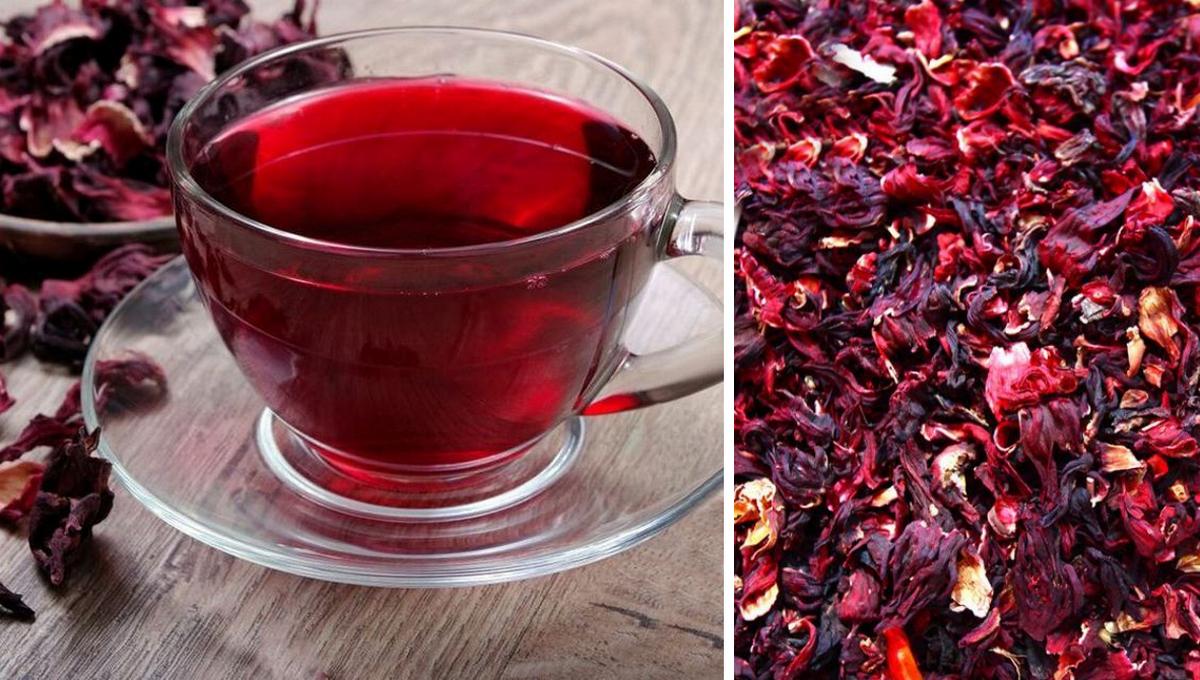The Egyptian national drink hibiscus has been around for thousands of years. Nutritionist Beth Cervoni from the American clinic listed seven amazing properties of this drink and announced its incredible health benefits.
Tea from a tropical plant has other names: rose of sharon, red sorrel and Sudanese rose. A bright red tea with a sweet and sour tart flavor is made from the petals of the rosella plant (Latin for hibiscus). It grows in India, Sudan, Mexico, China, Egypt, Sri Lanka, Thailand and the island of Java.
The fruity aroma of hibiscus is tangy and sweet, making it perfect for tea. According to the expert, a decoction of the leaves of the plant promotes a healthy lifestyle.
Benefits of Hibiscus
For centuries, people have used hibiscus seeds, flowers, leaves, and stems for food and traditional medicine. Today, hibiscus flavored jams, jellies, sauces, syrups and teas can be found all over the world. This ingredient is especially popular in West Africa, Central and South America and the Caribbean. For example, the Arabs considered hibiscus a panacea – a cure for all diseases as a remedy for high blood pressure and as an aid in indigestion.
Modern science also supports the idea that this time-tested remedy offers many health benefits. But Cervoni cautioned that more research is needed to know exactly how hibiscus supplements can help treat certain conditions.
Protects with Antioxidants
The hibiscus plant is rich in antioxidants such as beta-carotene, vitamin C, and anthocyanins. “Foods rich in antioxidants really help with many diseases,” she confirmed.
Antioxidants destroy harmful molecules known as free radicals in your body. Free radicals damage cells that contribute to diseases such as cancer, heart disease, and diabetes. While the body uses its own antioxidants to fight free radicals, foods rich in antioxidants can also play a role in disease prevention.
Supports Liver Health
Hibiscus helps support liver health, according to several studies. The extract protects the liver from various toxins, probably due to its powerful antioxidant activity. It even showed some anti-cancer activity in laboratory tests of liver cells. In addition, the drink calms and restores vigor, and also relieves allergic intoxication.
Fights inflammation
Several animal studies and a few smaller human studies have shown hibiscus’ ability to fight inflammation, the expert said.
Inflammation plays a role in the development of many diseases, including cancer, asthma, Alzheimer’s disease, heart disease, and rheumatoid arthritis. While more research is needed, it appears that hibiscus may have beneficial anti-inflammatory effects.
Reduces blood pressure
High blood pressure is a common problem that leads to serious health problems such as heart attack, stroke, heart failure, and kidney disease. Drinking hibiscus tea has been shown in clinical trials to lower blood pressure in humans.
However, the National Center for Complementary and Integrative Health noted that hibiscus and other herbal remedies only slightly lower blood pressure. They cannot replace medication for those diagnosed with high blood pressure.
Reduces cholesterol levels
High cholesterol is another health problem that affects millions of people and leads to the development of serious diseases such as heart attack and stroke. While some clinical studies have shown hibiscus to lower cholesterol levels, others have shown little effect. According to the expert, hibiscus may help maintain healthy cholesterol levels.
Promotes weight loss
Several studies have shown a positive effect of the plant on weight loss, which may prevent obesity, but these studies used hibiscus extract, which is a more concentrated form than hibiscus tea. It is not yet known whether tea is able to show such a result. As for the reviews of people, they note that tea has a beneficial effect on the metabolic rate in the body.
Fights bacteria
In laboratory studies, hibiscus extract has been shown to control certain types of bacteria and is used as an adjunct to parasite control therapy. It is used as an adjunct in the treatment of boils, staphylococcal infections, dysbacteriosis, diseases of the upper respiratory tract, cystitis and other infectious diseases. While it is clear that hibiscus has antibacterial properties, researchers are studying its effectiveness in humans.
Experts advise drinking only 1-2 cups of hibiscus a day.
Is hibiscus safe?
Control Department The US Food and Drug Administration (FDA) considers hibiscus safe to eat. However, in rare cases, there may be an allergic reaction to the plant. In very high doses, hibiscus can cause liver damage.
“You can certainly safely add hibiscus to your diet,” Cervoni said. But at the same time, the nutritionist recommended discussing with the doctor the use of hibiscus extract, as it can interact with certain medications.
What is the best way to take hibiscus?
Hibiscus comes in several forms:
Tea: You can make hibiscus tea by soaking dried hibiscus buds (called cups) in boiling water, or you can use dried hibiscus, the medic said.
Powder: You can also buy hibiscus powder, made from the dried parts of the finely ground plants. Mix the powder with water to make a drink, the expert suggested.
Extract: Hibiscus extract is a concentrated liquid supplement form. You can buy them at health food or herbal supplement stores.
At the same time, according to the nutritionist, you should drink tea from hibiscus, and not powder or extract. “Hibiscus tea—whether you purchase it already prepared, use tea bags, or brew your own from the dried plant—is the least expensive and most readily available. And powders and extracts can differ in strength and concentration, so you can get too strong a dose, ”she explained.
Contraindications
Doctors do not recommend drinking hibiscus tea to pregnant women, people with heart problems, children under 1 year old, suffering from gastritis or ulcers, patients taking paracetamol or containing drugs, and also use it during hormone therapy.

